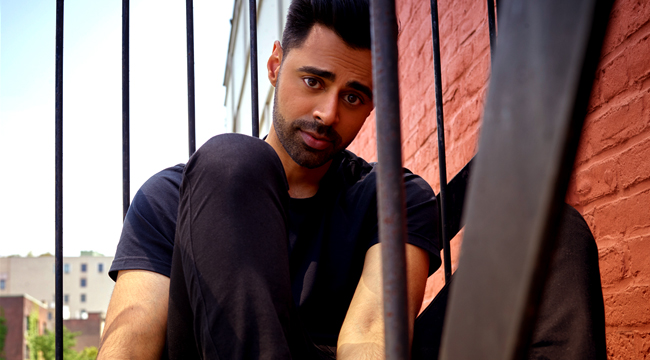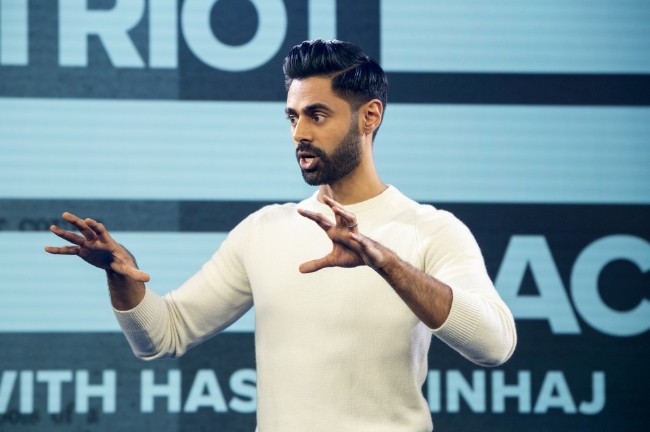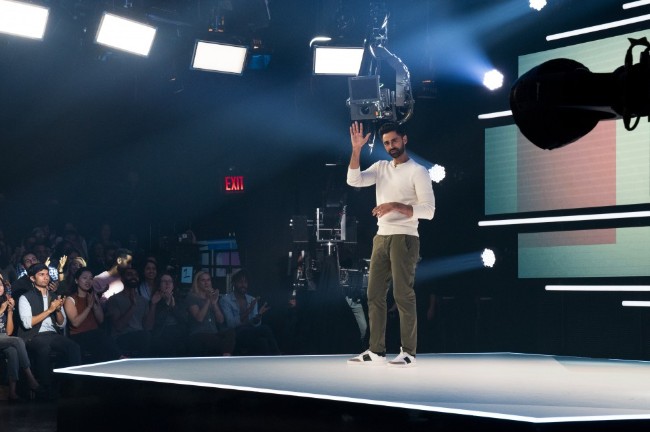
Trying to nail down a time to talk to Hasan Minhaj about Patriot Act, his new Netflix series, is quite the challenge. Not that this should come as a surprise, though, because the former Daily Show correspondent turned Netflix comedy star is in high demand these days. Not only did the streaming service give him and his team an “unprecedented” 32-episode order for Patriot Act, but his sketch comedy troupe Goatface will soon drop a new special on Comedy Central. So yeah, getting in touch is tough, but not impossible.
So after some production schedule shifts and a last-minute showrunner meeting, Minhaj graciously hopped on the phone to chat about the final days before the Patriot Act premiere drops this Sunday. Understandably tired but ready to go, the 33-year-old comedian laughs when I ask him how exhausted he is, and whether or not the 32-episode order was a bit much. Despite all the long days and numerous delays, however, Minhaj is no less excited about the prospect of doing something entirely new.
Sounds like you’ve had a pretty busy day.
I mean, we’re launching a show and it’s that time, you know? It’s all the jitters. It’s all the excitement, the cuts, the edits, the tweaks and the revisions of the final thing before you show it to the world.
Do you thrive in these kinds of moments? Or do you find that you sometimes need a break?
I think the biggest thing that I try to do in those moments of pure chaos and excitement is, I just try to quiet things down in my head. I try to really think about, “What do I want to say and share with the world?” Sometimes that gets tough, but I try to remind myself as an artist that the best things I’ve contributed to in my career have been those times when I’ve honored those things that I really, really feel deep down in my heart.
Netflix gave you guys a 32-episode order from the get-go. Was that a big confidence booster, or did you see it as more of a challenge?
For me, the biggest thing is I’ve been working on the concept of Patriot Act for the past two years. When the time came to take that idea out to the marketplace, I shot my own proof of concept. I’ve always had a very clear vision for the way I wanted the show to look and feel. To be executed, even. It was tailor-made for my strengths and what I wanted to do as an artist. Netflix really connected with it. They really loved the proof of concept and the vision we had for it. This is how I do storytelling, like in Homecoming King, so I’ve tailored the show around these strengths as a performer and storyteller. That gave them that confidence to go, “I think this type of show needs to exist on our platform.”
A lot of time, when creators bring a show to the marketplace, it’s their idea. It’s an idea in their head, and maybe something’s written down on paper, but that’s it. It’s not a video link that you can hit “play” on and go, “This is the exact vision, right here, from minute 0:00 to 23:00. All 23 minutes of it.” But we decided to do that, so we could show directly how it starts, how it takes off and how it ends. Even the credits. You see all of it. You can touch it and feel it, and I think that’s what really made this special, and what convinced Netflix to become such huge supporters and fans of it. So I’m glad it worked out. I’m glad they believe in me now.

You and series co-creator Prashanth Venkataramanujam have worked together frequently these past few years. Was he a part of this from the get-go, or did you bring him on later?
Coming out of Homecoming King, we started chatting about what I wanted to do next. What we wanted to work on together, that is. We’ve written movies and TV shows together. He consulted on Homecoming King and was the head writer for the White House Correspondent’s Dinner. To have that brotherly and artistic connection with someone is really special. It’s one of those things where I told him the idea that I had for Patriot Act and we just started writing it together. What was originally a sort of loose idea for a one-man show became these episodic bits. For each of these acts I was thinking, “Oh, this is going to be a one-man show,” and then they became episodes. I realized this was a series, so we started writing it out together. It was just the two of us. We started researching stuff and really fleshing it out. I can’t tell you how great it’s been, working with Prashanth.
Were you guys tackling it as a one-person show for a while, or did it quickly turn into the series?
It happened pretty quickly. I was spitballing with him. I said, “I have an act that I’m thinking about. It’s on this and that, and I was thinking act two could be this and act three could be that.” One of the things I noticed was, there wasn’t a clear narrative thread to connect these acts. It was just a loose set of experiences I had had on various topics or issues. All these things that were, and still are, happening in America and around the globe. That’s when I realized what it was and told Prashanth, “These are episodes!”
That’s when we really started riffing. “What if this was a full-on show? What if this was the series?” Then I thought, with the way this is being visually executed and the way it’s being done, it’s a hybrid of political satire and late night shows, but it has all the theatrics of a full-on live show. It exists in this unique space, and realizing this let us really start talking about it. “You can’t describe that, you have to do it. Can we do this?” That was really the impetus, asking if certain things could even be done. And instead of going through the pilot process, we decided to do it ourselves. “Can we build this storytelling Ferrari that has all these graphics, deep dives and investigative reporting, while I come in and out of the screens?”
Those were the questions we started asking ourselves, and we became committed to answering them on our own. We started beating stuff out and we did it, all before we started presenting it. That, to me, was the biggest test. Figuring out if we could so something like this, on this scale, with the team we had. And again, having someone like Prashanth, who is a totally collaborative and creative person, is what made it work. He sees what I’m trying to do and always knows how I can strengthen it. He always asks me, “What if you thought about it this way?”
I like that, calling it a “storytelling Ferrari.”
Yeah, it’s definitely a different way of framing things.
Speaking of framing things, you recently said “I don’t want to be sitting behind a desk in front of a city skyline” while talking about Patriot Act‘s format. That’s the longstanding late-night standard, of course, so I understand your apprehension. I’m just curious if there’s another reason for it.
It doesn’t play to my strengths. I created this visual language with Homecoming King, and that’s the thing that made me realize I’d made this thing that feels like me, like Hasan Minhaj. People use it as a verb or a noun now. “Oh, you’re doing it like Homecoming King. You’re Homecoming King-ing it.” It’s this different way to tell stories, interacting with the graphics on the screen, and then the graphics pop out sometimes, or they’re replaced with different shots, clips and videos. It’s kind of amazing, really, to think that we’ve created our own unique visual storytelling language.
That sounds really pompous, and I don’t mean it that way at all, but that’s what it feels like sometimes. And working on Patriot Act, I was like, “Let’s lean into this.” Instead of mining my own personal experience all the time, which you can only mine so much of, we wanted to expand that beyond to other things in the country and across the world. Instead of an investigation of myself, it’s an investigation of what’s happening out there, both here in the U.S. everywhere else on the planet. And doing a lot of that visually really helps. It helps us reach even more people, hopefully.

Regarding your live show “theatrics” comment, some friends attended “Before the Storm” show in Boston last month. They said you were trying things out with multimedia that might make it into Patriot Act.
It’s been cool. That’s what’s been so amazing about the tour, is that people think when they’re coming to the tour, they’re getting Homecoming King 2: Return of the King or something equally ridiculous. But it’s actually something else entirely. “Whoa, he’s straight-up doing political investigative bits, live on stage, in a theater for 2,000 people.” And that’s exactly what I’m doing. I’m going right through the headlines and telling them, “Hey, I’ve been working on this for the past six months to a year. Here’s what I’ve found.” It’s just another form of storytelling.
It seems that was getting a great response on the road, but have you given any thought to how viewers might respond once it drops on Netflix? Or do you actively avoid thinking about it?
That’s the variable you never have control over as an artist. I only have control over two things, really. Am I speaking from my heart? And am I adding something of value? That is to say, am I adding a position or a take that hasn’t been heard before, from anyone or anywhere else? That’s been my biggest inspiration for Patriot Act. My unique identity as an American is very complicated and interesting, and I think I’m just… Look, I’m an American citizen. I’m an American just like anyone else, but this idea of being an insider and an outsider at the same time in this country, while holding citizenship and being born in this country… I don’t think we’ve heard enough from that type of voice in this medium.
Which seems to be one of the most important aspects of Patriot Act being on Netflix, which seems to be catering more of its content for younger viewers. It’s the same demo that has, more often than not, watched The Daily Show and programs like it. Is that something you’ve considered throughout this process? The kind of people who’ll be watching this?
Absolutely! We’ve designed this show to thrive on Netflix as a platform. Honestly, to me, the medium is the message. I understand that people who use Netflix as a platform will often dive in at any point in time. Sometimes they dive in with great urgency, like, “I need to see that thing right now! It just came out!” Other times, they’ll revisit things a month later because of how great their friends say it was. Shows, documentaries and things like that. With the way that I tell stories, I want things to always feel urgent and timeless. Even the narrative I was telling in Homecoming King — a story from my childhood and teenage years, but in the backdrop of where America is right now, when we talk about things like September 11th, Homeland Security and racial identity — is both urgent and timeless. All of those things feel like they’ve already happened and they’re happening right now.
Right, and it’s a smart approach to take, considering the viewing habits of streaming are vastly different from broadcast or cable television.
Oh, for sure. That actually informed the topics I chose to cover in Patriot Act. We’re in hyperdrive right now because of everything that’s going on politically, but we have so much more room to operate and investigate. We have the ability to go information-fracking, to raise larger questions, ideas and thoughts about certain subjects. To address the things that people should be thinking about, going forward. That, to me, is really interesting. Instead of chasing covfefe, I giving you something to think about or talk about.
‘Patriot Act with Hasan Minhaj’ premieres Sunday, October 28th on Netflix.






